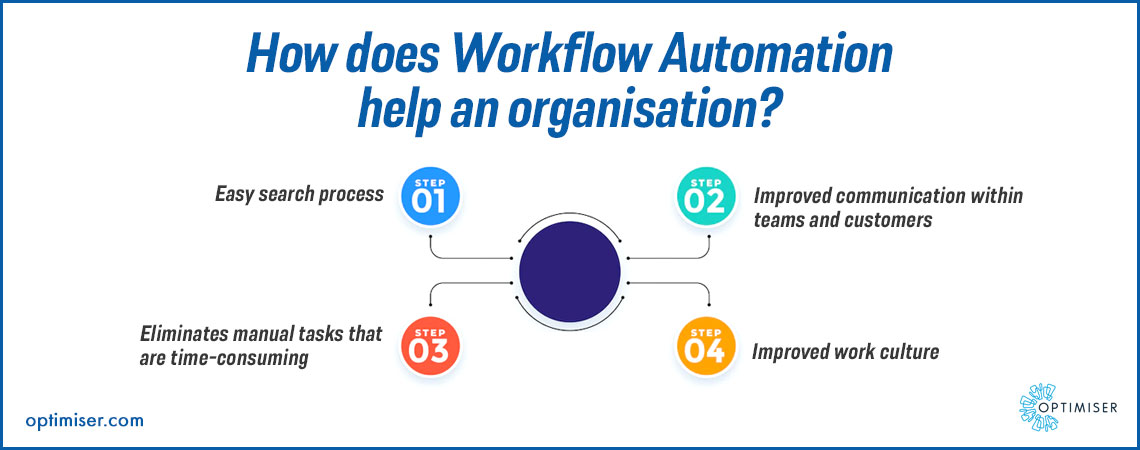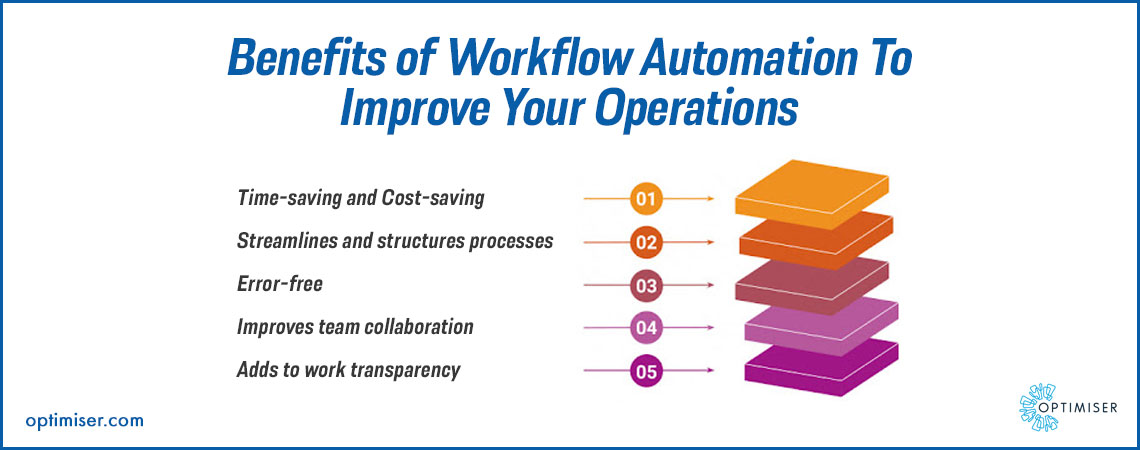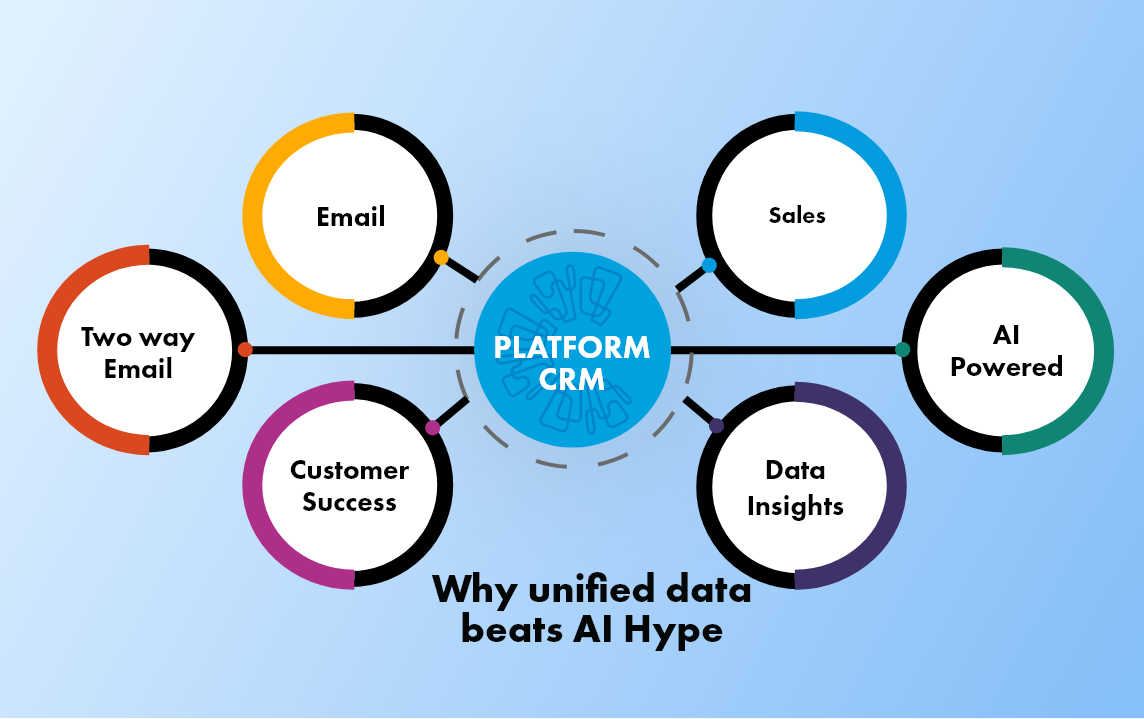
Benefits of Workflow Automation to Improve your Operations
As per Gartner, about 69% of managerial work will be automated by 2024. And about 78% of business leaders firmly believe that automating tasks in an organisation can increase productivity.
Workflow automation has several benefits that can benefit all. Manual tasks that require constant human interactions can be accomplished without any errors.

Here is a look into what are the benefits of Workflow Automation to improve your operations:
1. Time-saving
About 85% of business leaders believe that automating workload will free up their employees to work on what truly matters to the company. Many of the repetitive tasks are unnecessary and time-consuming. They are a deterrent to productivity. For example, about 30 percent of the accounting work needs retouches as it has many errors when done manually. By automation, it can be mitigated entirely, however. Using workflow automation software, you can avoid doing these tedious tasks like data entry, sending bulk emails, creating reports etc. Instead, you can focus on tasks and projects that require your utmost attention.
2. Cost-saving
A 398% ROI has been reported by companies who implemented low-code workflow automation for their business processes, as per Forrester.
Workflow automation software saves time as well as cost. While 31% of leaders have agreed that automaton software reduces labour costs, 57% of IT leaders add that automation saves the IT department costs between 10 and 50% associated with manual processing.
Cost savings by workflow automation are not induced in a day. They take time to build up, but it ensures that any monotonous tasks are removed from your employee's schedule and boosts the efficiency within the organisation.
3. Error-free
More than half of all the organisations have agreed that BPA or business process automation has significantly minimised human error in the workflow.
Manual data entry jobs come with a 1% error acceptance rate. But, even that much can significantly take over an employee's productivity. Optimiser offers a workflow automation solution that is error-free. Allowing the AI-enabled platform to track the whole process from end to end, Optimiser keeps the teams involved updated about the risks and errors that might come their way.
After all, why should a business even have to accept a 1% error rate when they can invest a little into a platform that will do it within minutes without errors or any duplication.
4. Collaboration
About 70% of business leaders believe that automation can help them build an effective workforce that is loyal and productive.
Communication tools are helpful for this purpose, but workflow automation can add to that. It keeps track of every interaction that has been made. It tracks tasks, flies shared, notes made, meetings etc. It improves transparency within an organisation. It connected people as well as connected them to the software. To keep better track of your tasks, you can connect your process stacks with workflow automation.
5. Transparency
As an essential feature, workflow automation's tracking tool can enhance transparency. It increases accountability within an organisation. You can assign tasks from a project and keep up with their progress. In the Optimiser platform, you can even adjust the frequency with which the tasks have to be accomplished. Since multiple people are working on a project, you can assign segments of the project to every employee. This ensures that two employees do not end up doing the same activity.

6. Streamline business process
Any new company can waste much time defining a streamlined process for efficiency that will suit their organisation. In this case, they even end up losing revenue. With workflow automation, they can develop well-defined workflow automation that suits the unique needs of every organisation and reduces redundancy. In addition, the companies can test new strategies and improve the ROI.
7. Multitasking
Workflow automation supports multitasking as it allows managers to handle multiple projects simultaneously. Tasks, chats, and projects are shelved separately with tags to ensure easy search. In addition, notification reminders are sent so that the managers never miss a deadline. As a result, all the progress of the running projects can be kept up with and delivered on time effectively.
8. Eliminate manual tasks
Onto the main point about workflow automation, repetitive tasks cost about $5 trillion in lost productivity annually. With a solution like workflow automation, one can easily automate tracking projects, administrative tasks like updating customer information, approvals, project proposals, sending emails to segmented lists etc.
You can set up triggers based on customer action using the If/ And criteria. It will automatically delegate tasks when a set of actions takes place.
9. Easy search process
The best benefit of workflow automation is organisation. For example, it can be extremely tough to search for old documents and customer information. You can systematically organise all this data and set the proper parameters to retrieve the information later using workflow automation.
Summary
Improving communication with customers, workflow automation also delivers important information from previous clients.
Workflow automation gives the employees freedom to organise their teams and review projects with as much flexibility as possible. It ensures that they are motivated and goal-oriented. It aligns the goals of an individual and team goal with the business goals in the long run.

30 days free trial. No credit card required
 One powerful platform
One powerful platform
 Simple to use
Simple to use
 Comprehensive
Comprehensive



